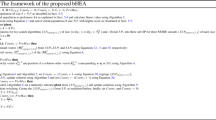Abstract
The Flexible Job Shop Scheduling Problem (FJSSP) represents a challenging applicative problem for metaheuristic algorithms because it imposes the development of innovative domain-dependent search operators that have to deal both with its combined discrete and permutation nature. Emerging as an effective approach for the resolution of a broad spectrum of hard optimization problems, some few discrete declinations of the Harmony Search (HS) algorithm have been recently proposed for tackling the FJSSP. Recent advances include an investigation of an innovative and promising permutation-based proposal. Accordingly, this paper proposes an Effective Operations Permutation-based Discrete Harmony Search (EOP-DHS) approach for FJSSP with Makespan criterion. The approach adopts an integrated two-part “affectation-sequencing” representation of the solution harmony and a dedicated improvisation operator particularly adapted to the integer-valued and operations permutation-based used coding scheme. Besides, a Modified Intelligent Mutation (MIM) operator is integrated to the adopted framework in order to enhance its overall search ability. Mainly, by balancing maximum machine workload during the overall search process, MIM operator allows essentially maintaining and enhancing the reciprocal equilibrium of diversification and intensification abilities of the proposed EOP-DHS algorithm. Conducted numerical experimentations on 188 benchmarking instances validate the proposal comparatively to a representative set of previously deployed metaheuristic approaches to FJSSP with Makespan criterion. Furthermore, main contribution of the paper is extended with an experimental procedure proving the effectiveness of the adopted permutation-based HS scheme for the resolution of combinatorial optimization problems. Hard benchmarking instances of the classical Job Shop Scheduling Problem (JSSP) are thus considered for exemplification.








Similar content being viewed by others
Explore related subjects
Discover the latest articles, news and stories from top researchers in related subjects.References
Brucker P, Schlie R (1990) Job-shop scheduling with multi-purpose machines. Computing 45(4):369–375
Garey M, Johnson D, Sethi R (1976) The complexity of flowshop and jobshop scheduling. Math Oper Res 1:117–129
Jain A, Meeran S (1999) Deterministic job-shop scheduling: past, present and future. Eur J Oper Res 113(2):390–434
Fattahi P, Saidi-Mehrabad M, Jolai F (2007) Mathematical modeling and heuristic approaches to flexible job shop scheduling problems. J Intell Manuf 18:331–342
Brandimarte P (1993) Routing and scheduling in a flexible job shop by tabu search. Ann Oper Res 41(3):157–183
Dauzère-Pérès S, Paulli J (1997) An integrated approach for modeling and solving the general multiprocessor job-shop scheduling problem using tabu search. Ann Oper Res 70:281–306
Mastrolill M, Gambardella L (2000) Effective neighborhood functions for the flexible job shop problem. J Sched 3:3–20
Saidi-Mehrabad M, Fattahi P (2007) Flexible job shop scheduling with tabu search algorithms. Int J Adv Manuf Technol 32(5-6):563–570
Li J, Pan Q K, Suganthan P, Chua T (2011) A hybrid tabu search algorithm with an efficient neighborhood structure for the flexible job shop scheduling problem. Int J Adv Manuf Technol 52(5-8):683–697
Kacem I, Hammadi S, Borne P (2002) Approach by localization and multiobjective evolutionary optimization for flexible job-shop scheduling. IEEE Trans Syst Man Cybern 32:1–13
Gen M, Gao J, Lin L (2009) Multistage-based genetic algorithm for flexible job-shop scheduling problem. In: Intelligent and evolutionary systems. Springer Berlin Heidelberg, pp 183– 196
Gao J, Gen M, Sun L, Zhao X (2007) A hybrid of genetic algorithm and bottleneck shifting for multiobjective flexible job shop scheduling problems. Comput Ind Eng 53(1):149–162
Gao J, Sun L, Gen M (2008) A hybrid genetic and variable neighborhood descent algorithm for flexible job shop scheduling problems. Comput Oper Res 35:2892–2907
Pezzella F, Morganti G, Ciaschetti G (2008) A genetic algorithm for the flexible job-shop scheduling problem. Comput Oper Res 35(10):3202–3212
Zhang G, Gao L, Shi Y (2011) An effective genetic algorithm for the flexible job-shop scheduling problem. Expert Syst Appl 38(4):3563–3573
Wu X, Wu S (2015) An elitist quantum-inspired evolutionary algorithm for the flexible job-shop scheduling problem. J Intell Manuf, pp 1–17, doi:10.1007/s10845-015-1060-6
Rahmati SH, Zandieh M (2012) A new biogeography-based optimization (BBO) algorithm for the flexible job shop scheduling problem. Int J Adv Manuf Technol 58(9–12):1115–1129
Yazdani M, Amiri M, Zandieh M (2010) Flexible job-shop scheduling with parallel variable neighborhood search algorithm. Expert Syst Appl 37(1):678–687
Bagheri A, Zandieh M, Mahdavi I, Yazdani M (2010) An artificial immune algorithm for the flexible job-shop scheduling problem. Futur Gener Comput Syst 26(4):533–541
Wang L, Wang S, Xu Y, Zhou G, Liu M (2012) A bi-population based estimation of distribution algorithm for the flexible job-shop scheduling problem. Comput Ind Eng 62(4):917–926
Wang L, Zhou G, Xu Y, Wang S, Liu M (2012) An effective artificial bee colony algorithm for the flexible job-shop scheduling problem. Int J Adv Manuf Technol 60(1-4):303–315
Nouiri M, Bekrar A, Jemai A, Niar S, Ammari A (2015) An effective and distributed particle swarm optimization algorithm for flexible job-shop scheduling problem. J Intell Manuf, pp 1–13. doi:10.1007/s10845-015-1039-3
Teekeng W, Thammano A, Unkaw P, Kiatwuthiamorn J (2016) A new algorithm for flexible job-shop scheduling problem based on particle swarm optimization. Artif Life Robot 21(1):18–23
Roshanaei V, Azab A, ElMaraghy H (2013) Mathematical modelling and a meta-heuristic for flexible job shop scheduling. Int J Prod Res 51(20):6247–6274
Chaudhry I, Khan (2016) A research survey: review of flexible job shop scheduling techniques. Int Trans Oper Res 23(3):551– 591
Kobti Z (2012) A memetic algorithm for job shop scheduling using a critical-path-based local search heuristic. Memet Comput 4(3):231–245
Çaliş B, Bulkan S (2015) A research survey: review of AI solution strategies of job shop scheduling problem. J Intell Manuf 26(5):961–973
Zhao F, Zhang J, Zhang C, Wang J (2015) An improved shuffled complex evolution algorithm with sequence mapping mechanism for job shop scheduling problems. Expert Syst Appl 42(8):3953–3966
Kurdi M (2016) An effective new island model genetic algorithm for job shop scheduling problem. Comput Oper Res 67:132– 142
Asadzadeh L (2015) A local search genetic algorithm for the job shop scheduling problem with intelligent agents. Comput Ind Eng 85:376–383
Wang X, Duan H (2014) A hybrid biogeography-based optimization algorithm for job shop scheduling problem. Comput Ind Eng 73:96–114
Dao T, Pan T, Pan J (2015) Parallel bat algorithm for optimizing makespan in job shop scheduling problems. J Intell Manuf, pp 1–12
Geem Z W, Kim J H, Loganathan G (2001) A new heuristic optimization algorithm: harmony search. Simulation 76(2):60–68
Manjarres D, Landa-Torres I, Gil-Lopez S, Del Ser J, Bilbao M, Salcedo-Sanz S, Geem Z (2013) A survey on applications of the harmony search algorithm. Eng Appl Artif Intell 26(8):1818– 1831
Kong X, Gao L, Ouyang H, Li S (2015) A simplified binary harmony search algorithm for large scale 0–1 knapsack problems. Expert Syst Appl 42(12):5337–5355
Lee K, Geem Z, Lee S, Bae KW (2005) The harmony search heuristic algorithm for discrete structural optimization. Eng Optim 37:663–684
Mahdavi M, Fesanghary M, Damangir E (2007) An improved harmony search algorithm for solving optimization problems. Appl Math Comput 188:1567–1579
Moh’d Alia O, Mandava R (2011) The variants of the harmony search algorithm: an overview. Artif Intell Rev 36(1):49–68
Zou D, Gao L, Wu J, Li S, Li Y (2010) A novel global harmony search algorithm for reliability problems. Comput Ind Eng 58(2):307–316
Pandi V, Panigrahi B (2011) Dynamic economic load dispatch using hybrid swarm intelligence based harmony search algorithm. Expert Syst Appl 38(7):8509–8514
Pan QK, Suganthan PN, Liang JJ, Tasgetiren MF (2011) A local-best harmony search algorithm with dynamic sub-harmony memories for lot-streaming flow shop scheduling problem. Expert Syst Appl 38(4):3252–3259
Wang L, Pan Q K, Tasgetiren M (2011) A hybrid harmony search algorithm for the blocking permutation flow shop scheduling problem. Comput Ind Eng 61(1):76–83
Wang L, Pan Q, Tasgetiren M (2010) Minimizing the total flow time in a flow shop with blocking by using hybrid harmony search algorithms. Expert Syst Appl 37(12):7929–7936
Chen J, Pan Q K, Wang L, Li J (2012) A hybrid dynamic harmony search algorithm for identical parallel machines scheduling. Eng Optim 44(2):209–224
Gao K, Pan Q K, Li J Q (2011) Discrete harmony search algorithm for the no-wait flow shop scheduling problem with total flow time criterion. Int J Adv Manuf Technol 56(5-8):683–692
Liu L, Zhou H (2013) Hybridization of harmony search with variable neighborhood search for restrictive single-machine earliness/tardiness problem. Inf Sci 226:68–92
Yuan Y, Xu H, Yang J (2013) A hybrid harmony search algorithm for the flexible job shop scheduling problem. Appl Soft Comput 13(7):3259–3272
Gao K, Suganthan P, Pan Q K, Chua T, Cai T, Chong C (2016) Discrete harmony search algorithm for flexible job shop scheduling problem with multiple objectives. J Intell Manuf 27(2):363–374
Gao K, Suganthan P, Pan Q K, Tasgetiren M (2015) An effective discrete harmony search algorithm for flexible job shop scheduling problem with fuzzy processing time. Int J Prod Res 53(19):5896–5911
Gaham M, Bouzouia B, Achour N, Tebani K (2016) Meta-heuristics approaches for the flexible job shop scheduling problem Metaheuristics for Production Systems. Springer International Publishing, pp 285–314
Chiang T, Lin H (2013) A simple and effective evolutionary algorithm for multiobjective flexible job shop scheduling. Int J Prod Econ 141(1):87–98
Wilcoxon F (1945) Individual comparisons by ranking methods. Biom Bull 1(6):80–83
Derrac J, García S, Molina D, Herrera F (2011) A practical tutorial on the use of nonparametric statistical tests as a methodology for comparing evolutionary and swarm intelligence algorithms. Swarm Evol Comput 1(1):3–18
Lu C, Xiao S, Li X, Gao L (2016) An effective multi-objective discrete grey wolf optimizer for a real-world scheduling problem in welding production. Adv Eng Softw 99:161–176
Lu C, Gao L, Li X, Xiao S (2017) A hybrid multi-objective grey wolf optimizer for dynamic scheduling in a real-world welding industry. Eng Appl Artif Intell 57:61–79
Dauzère-Pérès S, Paulli J (1997) An integrated approach for modeling and solving the general multiprocessor job-shop scheduling problem using tabu search. Ann Oper Res 70:281–306
Barnes JW, Chambers JB (1996) Flexible job shop scheduling by tabu search. Graduate program in operations research and industrial engineering. Technical Report ORP 9609. University of Texas, Austin. http://www.cs.utexas.edu/users/jbc/
Hurink J, Jurisch B (1994) Tabu search for the job-shop scheduling problem with multi-purpose machines. Oper Res Spektrum 15(4):205–215
Li X (2016) An effective hybrid genetic algorithm and tabu search for flexible job shop scheduling problem. Int J Prod Econ 174:93–110
Al-Hinai N (2011) An efficient hybridized genetic algorithm architecture for the flexible job shop scheduling problem. Flex Serv Manuf J 23(1):64–85
Beasley J (1990) OR-Library: distributing test problems by electronic mail. J Oper Res Soc 41(11):1069–1072
Ombuki B, Ventresca M (2004) Local search genetic algorithms for the job shop scheduling problem. Appl Intell 21(1):99–109
Author information
Authors and Affiliations
Corresponding author
Rights and permissions
About this article
Cite this article
Gaham, M., Bouzouia, B. & Achour, N. An effective operations permutation-based discrete harmony search approach for the flexible job shop scheduling problem with makespan criterion. Appl Intell 48, 1423–1441 (2018). https://doi.org/10.1007/s10489-017-0993-1
Published:
Issue Date:
DOI: https://doi.org/10.1007/s10489-017-0993-1




